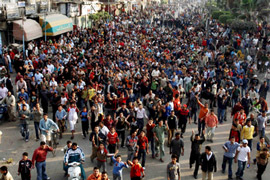Security fears as food prices soar
Inflation seen as contributing to growing emergency and straining global economy.

Between $1.2bn and $1.8bn is needed to help ease the crises in developing nations, he said.
An FAO report released this week says that 37 countries were experiencing severe problems in supplying cheap food to their citizens.
Speculation on world food markets is reducing the effectiveness of increased food production, the report said.
Price riots
Riots over rising food prices began in southern Haiti earlier this week and quickly spread to the capital Port-au-Prince.
| Food crisis |
|
Video: Setting food prices in the United States Video: The casualties of Egypt’s food crisis Video: Prices force South Africans to shop differently |
food rights
Tens of thousands of people took to the streets to protest against the food price increases.
Four were killed in the disturbances, while UN peacekeepers used rubber bullets and tear gas to drive away rioters from the presidential palace.
Most Haitians live on less than $2 a day.
Reports suggest some people have turned to eating cookies made of dirt, vegetable oil and salt.
Meanwhile, at least seven people have died in Egypt in riots earlier this week, sparked partly by rises in the price of bread of other foods.
Similar riots have been reported in Burkina Faso, Mauritania, Indonesia and Peru.
Biofuels link
The increased use of grains to produce biofuels, first heralded as a way to cut greenhouse gases, has been blamed for contributing to rises in the cost of basic foods.
| Your Views |
A rising demand for food in emerging market economies has further contributed to grain shortages.
The International Monetary Fund (IMF) has calculated that corn ethanol production in the US accounted for at least half the rise in world corn demand in each of the past three years.
Washington provides a subsidy of $0.51 per gallon to ethanol blenders and imposes a tariff of $0.54 per gallon on imports.
In the European Union (EU), most countries exempt biofuels from some gas taxes and impose an average tariff equal to more than $0.70 per gallon of imported ethanol.
Historic levels
Robert Zoellick, president of the World Bank, said on Thursday that while people in developed nations complained about the high cost of fuel to run their cars, poor people in developing nations were struggling to feed themselves.
| Global food crisis |
|
Food riots have erupted in Haiti, Egypt, Cameroon, Ivory Coast, Senegal, Burkina Faso, Ethiopia, Indonesia, Madagascar, the Philippines and Haiti in the past month
In Pakistan and Thailand, army troops have been deployed to avoid food being seized from fields and warehouses
Prices in these countries for foodstuffs such as rice, wheat, sorghum and maize have doubled
Causes of crisis range from financial speculation on food commodities, desertification, population increases, China and India’s economic growth and use of grains to make biofuels
Cost of funding projects enabling governments to tackle food crisis could be up to $1.7bn
However world cereal production in 2008 is projected to increase by 2.6 per cent to a record 2,164 million tonnes
Source: United Nations Food and Agricultural Organisation (FAO) |
“In many developing countries, the poor spend up to 75 per cent of their income on food. When prices of basic foods rise, it hits hard”, he said.
“In just two months, rice prices have skyrocketed to near historic levels, rising by around 75 per cent globally and more in some markets – with more to come.”
Zoellick said the world needs to recognise that food price inflation is contributing to a growing emergency.
The UN World Food Programme has said it requires $500m just to fill immediate need.
The World Bank says food price inflation is not a short-term phenomenon but will likely persist through 2008 and 2009 before demand slackens due to high prices.
Most people in the world’s wealthiest countries take food for granted.
Even the poorest fifth of households in the US spend only 16 per cent of their budget on food.
In contrast, Nigerian families spend 73 per cent of their budgets on eating, Vietnamese 65 per cent, while Indonesians allocate about 50 per cent.
Last year, the food import bill of developing countries rose by 25 per cent as food prices rose to levels not seen in a generation.
Food commodities
World financers have also contibuted to the food price problem.
 |
|
Rising bread prices in Egypt have contributed |
Commodities have attracted investors looking for a safe haven from failing investments in the highly-leverage mortgage sector.
Amid this speculation, world wheat prices rose 70 per cent between 2005 and 2007.
In the same period, corn gained 80 per cent in value, while dairy prices nearly doubled.
A senior UN official has said that global investment funds and the weak dollar are largely to blame for the world’s rise in food prices.
“The crisis is a speculative attack and it will last”, Jose Graziano, the UN food and farm organisation’s regional representative for Latin America and the Caribbean, said.
“The lack of confidence in the [US] dollar has led investment funds to look for higher returns in commodities … first metals and then foods.”

